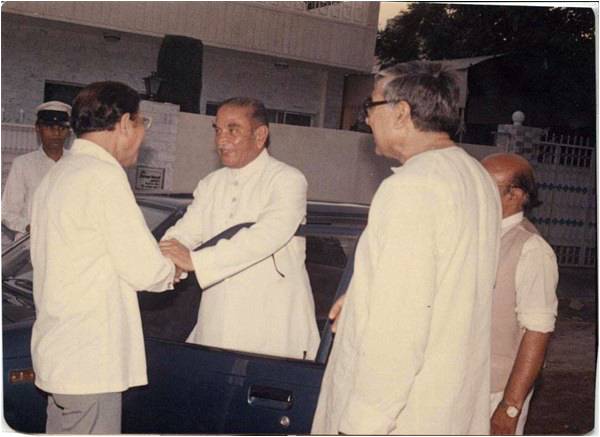
October 17 is the death anniversary of Hakim Said, photographed here in this undated image. Hakim saheb was a scholar and the most famous medical researcher of Sindh at the time, renowned for his inquiries into the art of Tibb. He is a household name because of the Hamdard Foundation he started in 1948.
Hakim Said moved to Pakistan in that year. He was born in Delhi in 1920 and as was the tradition of the time, studied Arabic, Persian, Urdu, English and the Holy Quran. His family had been in the business of traditional medicine (Hamdard Waqf Laboratories) and so upon migration he opened Hamdard Dawakhana. Today it is a multi-billion rupee entity. He founded Hamdard University in 1985.
“One of his greatest achievements was having Eastern medicine recognised at the UN as an alternate way of treating illnesses,” says an article on one of his anniversaries, published in The Express Tribune after detailed interviews with his daughter Sadia. Hakim saheb also set up a college, which offered degrees in herbal medicine. “When health minister General Burki of the Field Marshal Ayub Khan regime tried to ban Eastern medicine, Hakim Said took the protest to the people, recalls Masood Ahmed Barkati, the long time editor of Urdu-language Naunehal children’s magazine of the Hamdard Foundation. General Burki used to say that eastern medicine and homeopathy were quackery. Hakim Said started writing in the newspapers, organised conferences and lobbied hard. Ultimately, Ayub Khan had to pass a law legalising eastern medicine.”
According to Barkati, Hakim Said paid especial attention to Naunehal, reading every draft before publication. “He used to say that today’s children will be tomorrow’s leaders.” Literary figures such as Ahmed Chugtai, Ahmed Hamdani, Qamar Hashmi, Nazeer Siddiqui and Qayum Rahi all worked for Hamdard publications at one time or another.
Hakim Said also served as Governor of Sindh from 1993 to 1996. He was assassinated on Arambagh road in 1998 and his murder prompted then Prime Minister Nawaz Sharif to impose federal rule on the province.
Hakim Said moved to Pakistan in that year. He was born in Delhi in 1920 and as was the tradition of the time, studied Arabic, Persian, Urdu, English and the Holy Quran. His family had been in the business of traditional medicine (Hamdard Waqf Laboratories) and so upon migration he opened Hamdard Dawakhana. Today it is a multi-billion rupee entity. He founded Hamdard University in 1985.
“One of his greatest achievements was having Eastern medicine recognised at the UN as an alternate way of treating illnesses,” says an article on one of his anniversaries, published in The Express Tribune after detailed interviews with his daughter Sadia. Hakim saheb also set up a college, which offered degrees in herbal medicine. “When health minister General Burki of the Field Marshal Ayub Khan regime tried to ban Eastern medicine, Hakim Said took the protest to the people, recalls Masood Ahmed Barkati, the long time editor of Urdu-language Naunehal children’s magazine of the Hamdard Foundation. General Burki used to say that eastern medicine and homeopathy were quackery. Hakim Said started writing in the newspapers, organised conferences and lobbied hard. Ultimately, Ayub Khan had to pass a law legalising eastern medicine.”
According to Barkati, Hakim Said paid especial attention to Naunehal, reading every draft before publication. “He used to say that today’s children will be tomorrow’s leaders.” Literary figures such as Ahmed Chugtai, Ahmed Hamdani, Qamar Hashmi, Nazeer Siddiqui and Qayum Rahi all worked for Hamdard publications at one time or another.
Hakim Said also served as Governor of Sindh from 1993 to 1996. He was assassinated on Arambagh road in 1998 and his murder prompted then Prime Minister Nawaz Sharif to impose federal rule on the province.

